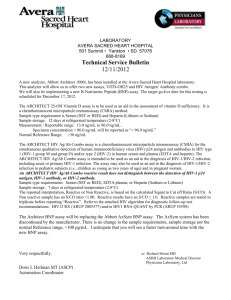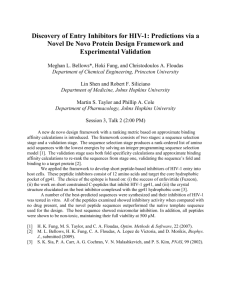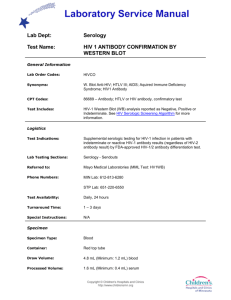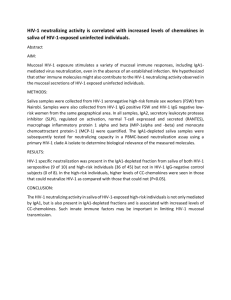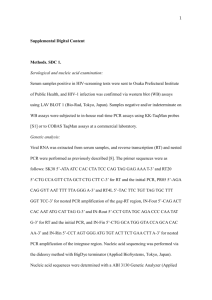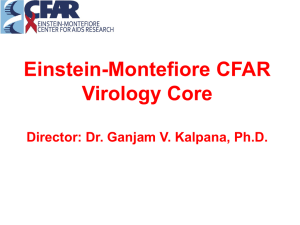Powerpoint
advertisement
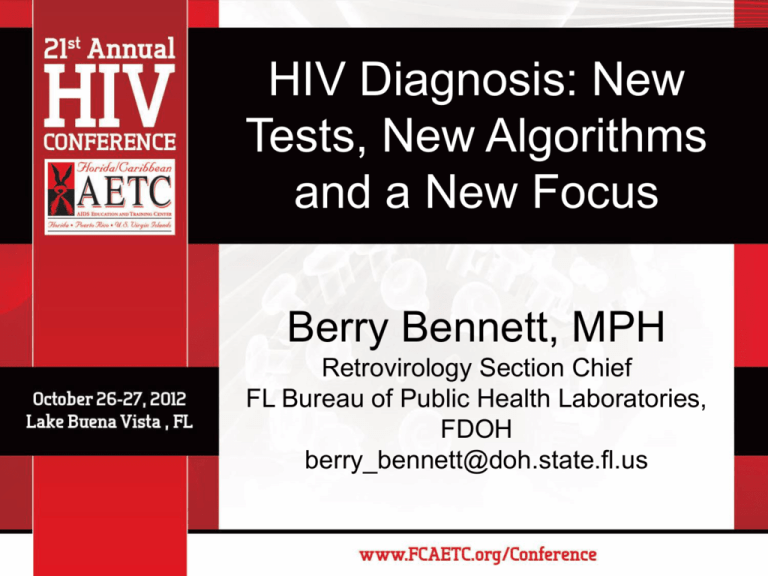
HIV Diagnosis: New Tests, New Algorithms and a New Focus Berry Bennett, MPH Retrovirology Section Chief FL Bureau of Public Health Laboratories, FDOH berry_bennett@doh.state.fl.us Disclosures of Financial Relationships This speaker has no significant financial relationships with commercial entities to disclose. This speaker will discuss off-label use or investigational product during the program. This slide set has been peer-reviewed to ensure that there are no conflicts of interest represented in the presentation. Common HIV-1 or HIV-1/2 Diagnostic Algorithm 1989………………………. The Public Health Service recommends that no positive test results be given to clients/patients until a screening test has been repeatedly reactive (i.e., greater than or equal to two tests) on the same specimen and a supplemental, more specific test such as the Western blot has been used to validate those results Common HIV-1 or HIV-1/2 POC Rapid Test Algorithm 1998……………….. Healthcare providers should provide preliminary positive test results before confirmatory results are available in situations where tested persons benefit. When additional rapid tests become available for use in the United States, the PHS will reevaluate algorithms using specific combinations of two or more rapid tests for screening and confirming HIV infection. Challenges with the 1989 & 1998 Diagnostic Algorithms • Antibody tests do not detect infection in ~10% of infected persons at highest risk of transmission1,2 • Western blot (WB) confirmation is less sensitive during early infection than many widely used screening tests • Assays were FDA-approved as screening or supplemental tests in the confirmatory process, not as part of “multi-test algorithm”. • WB and Immunofluorescent Assay (IFA) supplemental assays cannot differentiate HIV-1 from HIV-2 infections. 1) Patel, et.al. Arch Intern Med 2010; 170:66-74 2) Stekler et.al. Clin Infect Diseases 2009; 49:444-53 HIV-2 Cases Confirmed at CDC 2008-2010 *Data courtesy of Dr. Michele Owen, CDC, from CDC’s HIV Diagnostic Laboratory, 2008-2010. Detection of HIV by Diagnostic Tests Symptoms p24 Antigen HIV RNA HIV Enzyme Immune Assay (EIA)* Western blot 0 1 2 3 4 5 6 7 8 9 Weeks Since Infection Modified from After Fiebig et al, AIDS 2003; 17(13):1871-9 *4th generation, Ag/Ab Combo EIA *3rd generation, IgM-sensitive EIA *2nd generation EIA *viral lysate EIA 10 Characteristics & Performance of 4th Generation Immunoassays • Simultaneous qualitative detection of HIV-1 p24 antigen and antibodies to HIV-1 (Groups M and O) and HIV-2 in human serum or plasma. • Abbott Architect HIV Ag/Ab Combo chemiluminescent assay (CIA), June 2010. Package insert sensitivity 100% (95% CI = 94.31 - 100%). Package Insert specificity 99.77% (95% CI = 99.62 – 99.88%) • BioRad HIV Combo Ag/Ab EIA, July 2011. Package Insert sensitivity 100% (95% CI = 99.7 – 100%). Package Insert specificity 99.87% (95% CI = 99.76 – 99.93%). Process for Developing New HIV Testing Algorithms for the U.S. Association of Public Health Laboratories (APHL)/CDC HIV Steering Committee (2006) Algorithm Workgroups [Point of contact (POC) and Laboratory] Goal = Develop multiple acceptable HIV testing algorithms, i.e., a menu of options APHL & National Alliance of State and Territorial AIDS Directors (NASTAD) Public Health Surveys 2007 HIV Diagnostics Conference (December 5-7, Atlanta) Preparation of the Status Report, released April 2009 at www.aphl.org/hiv/statusreport Status Report promotion at national conferences 2010 HIV Diagnostics Conference (March 24-26, Orlando) Release of the Clinical and Laboratory Standards Institute (CLSI) Guidelines1, July 2011 CDC Dear Colleague letter to Surveillance Coordinators, Nov. 18, 2011 Each state must examine their case reporting and Ryan White eligibility criteria Ongoing data gathering: retrospective and prospective CDC Interim Guidance anticipated by mid-2012 2012 HIV Diagnostic Conference set for Dec. 12-14, 2012 1 Final CDC Recommendations to follow Criteria for Laboratory Testing and Diagnosis of Human Immunodeficiency Virus Infection: Approved Guidelines. Clinical and Laboratory Standards Institute, M53-A. CDC Dear Colleague Letter to Surveillance Coordinators – Nov. 18, 2011 “Supplemental HIV antibody tests” need not be limited to Western Blot or IFA. Other antibody tests are acceptable as supplemental tests, including some that might alternatively be used as initial screening tests, provided that the screening and supplemental tests are used together as parts of an algorithm. Characteristics of the Proposed HIV Diagnostic Algorithm • Detect acute as well as established HIV infections • Differentiate HIV-1 from HIV-2 • Get timely results to facilitate initiation of care more same day reporting • Eliminate indeterminate and inconclusive results whenever possible APHL/CDC HIV-1/2 Diagnostic Algorithm Template 4th Generation Immunoassays Options for Test A* • Simultaneous qualitative detection of HIV-1 p24 antigen and antibodies to HIV-1 (Groups M and O) and HIV-2 in human serum or plasma. • Abbott Architect HIV Ag/Ab Combo chemiluminescent assay (CIA), June 2010. • BioRad HIV Combo Ag/Ab EIA, July 2011. * 3rd generation IgM sensitive Ab assay is acceptable Possible HIV-1/HIV-2 Differentiation Immunoassays Options for Test B Non-FDA-approved FDA-approved Serum Control 1 2 3 4 5 gp36 gp160 gp120 gp41 gp24 Peptide HIV-2 gp36 Recombinant HIV-1 gp41 Peptide HIV-1 gp41 HIV-1 Nucleic Acid Amplification Tests (NAAT) Options for Test C • Only one HIV-1 RNA test is FDA-approved for use as an aid in the diagnosis of HIV-1 infection – APTIMA® HIV-1 RNA Qualitative Assay (Gen-Probe) – Approved for use with plasma and serum – Result is ‘RNA Detected/Not Detected’ • HIV-1 RNA Viral Load assays are FDA-approved for patient monitoring, i.e. assess prognosis, monitor effects of therapy – Not intended as a diagnostic test to confirm the presence of HIV-1 infection – Approved for use with plasma only – Lab would need to validate viral load test for use as a diagnostic test and for use with serum FBPHL – Jax. 10,000 Test Mark • 4/16/12 – 5/21/12 • 4th generation Abbott HIV-1/2 Ag/Ab Combo Performance; sensitivity = 100% (161/161) specificity = 99.8% (9819/9839) [PI claim 99.77% (99.62-99.88%)] • New algorithm performance; sensitivity = 100% (161/161) specificity = 99.99% (9838/9839) PPV = 99.4% (161/162) • No HIV-1 acute infections (AHIs) (algorithm defined) detected in the first 10,000 diagnostic tests. (2 AHIs detected in ~46,000 screens) • No HIV-2 cases detected. HIV-1 Acute Infection Case Study • 19 y/o MSM from Broward County Health Department • Last HIV-negative test 8/5/12 (rapid), client informed that his partner “X” was recently diagnosed HIV-1 positive on 8/3/12 • 1st blood draw on 8/15/12 and processed through the Florida Bureau of Public Health Laboratories (BPHL) new HIV Diagnostic Algorithm (4th gen CIA repeatedly reactive, Supplemental immunoassay [IA] nonreactive, HIV-1 nucleic acid amplification test [NAAT] positive). Reported as AHI on 8/24/12. • Subsequent blood draw on 8/24/12, seroconversion confirmed on 8/27/12. • At post-test (8/24/12) client admits to MSM risk with partner “X” between 7/25/12 and 8/7/12. The window period of detection for the 4th gen CIA on this case is estimated to be between 8 and 21 days. • HIV-1 baseline viral load performed 8/30/12 by Versant bDNA = 266,784 RNA copies/ml. Pregnancy and the New 4th Generation Immunoassays • • • Abbott 4th Generation CIA specificity = 100% (448/448 pregnant females at increased risk of HIV infection) compared to 98.9% (448/453) specificity for an HIV-1/2/O antibody assay. – Abbott HIV-1/2 Combo package insert BioRad 4th Generation EIA specificity = 99.89% (998/999) – BioRad Combo Ag/Ab EIA package insert Weslowski L, Delaney, K, et.al. “Rapid HIV Tests as Supplemental Tests in Pregnant Women and Others with Reactive IgM-Sensitive Immunoassay Results and Unconfirmed Western Blots” – International AIDS Conference July 2012 Rapid HIV Test Rapid Test Specificity Pregnant Women (n=838) (NAAT negative) Clearview® 99.88% (99.34%-99.97%) Multispot 99.16% (98.29%-99.66%) OraQuick® 99.76% (99.14%-99.97%) Uni-Gold™ 99.76% (99.14%-99.97%) • • Conclusion: The proportion of false-positive results was higher for non-pregnant persons than pregnant women (p<0.05). If one suspects a false-positive initial rapid test due to pregnancy, consider; 1) dual orthogonal rapid or lab-based algorithm, 2) Qualitative NAAT or 3) collect a subsequent blood specimen Proposed HIV Point of Care Algorithm Two Rapid Tests (A1/A2) Performed in Sequence on Blood or Oral Fluid (A1 and A2 must be different rapid tests) A1 [HIV-1 or HIV-1/2 rapid test (Blood or oral fluid)] A1+ A2 A1Negative for HIV-1 and HIV-2 antibodies* [HIV-1 or HIV 1/2 rapid test from a different manufacturer (blood)] A1+ A2+ Presumptive positive for HIV-1 or HIV-2 antibodies; requires medical follow-up for further evaluation and testing A1+ A2Inconclusive rapid test result; requires additional testing *If using an HIV-1 only rapid test, Negative for HIV-1 antibodies only FDA Approved HIV Rapid Tests Product Manufacturer Analyte Specimen Type Sensitivity Specificity FDA Approval Uni-Gold Recombigen™ HIV Trinity Biotech www.trinityusa.co m HIV-1 Whole blood, Serum, Plasma 100% 99.7% Dec. 2003 OraQuick ADVANCE® HIV-1/2 Orasure Technologies www.orasure.com HIV-1 HIV-2 Whole blood, Oral fluid, Plasma 99.6% BL 99.3% OF June 2004 *91.7% OF 100% BL 99.8% OF 99.9% plasma *99.98% OF OTC 7/2012 Multispot HIV1/HIV2 BioRad Labs www.bio-rad.com HIV-1 HIV-2 Serum, Plasma 100% 99.9% Nov. 2004 Clearview® HIV 1/2 STATPAK® & Complete HIV 1/2 Inverness Med. www.invernessme dicalpd.com HIV-1 HIV-2 Whole blood, Serum, Plasma 99.7% 99.9% May 2006 INSTI™ HIV-1 bioLytical Labs www.biolytical.com HIV-1 Whole blood, Plasma 99.8% 99.5% Nov. 2010 Reveal® G3 Rapid HIV-1 MedMira www.revealhiv.com HIV-1 Serum, Plasma 99.8% 99.1% serum 98.6% plasma Oct. 2006 * FDA. Summary of Safety and Effectiveness PMA # BP120001, 7/3/2012 FDA Approved HIV Rapid Tests OTC Application Rapid Tests Pending FDA Approval Alternative Algorithms • Individual or pooled NAAT on seronegative specimens (reflex testing) • Traditional algorithm with supplemental NAAT option instead of Western Blot. • Algorithms for oral fluid and dried fluid spot (DFS) specimens. • “Bridge algorithms” (POC – laboratory – clinical management) HIV Testing Algorithm Information • HIV Testing Algorithms: A Status Report (5/2009) http://www.aphl.org/hiv/statusreport • 2010 HIV Diagnostics Conference: http://www.hivtestingconference.org • CLSI M53-A, Criteria for Laboratory Testing and Diagnosis of HIV-1 Infection, June 2011. (Includes algorithms utilizing assays available outside the US as well as those FDA approved) • Original papers and review articles assembled in Special Supplement of J Clin Virol, 2011 • Updated CDC recommendations anticipated 2012. Thank you & Questions??
